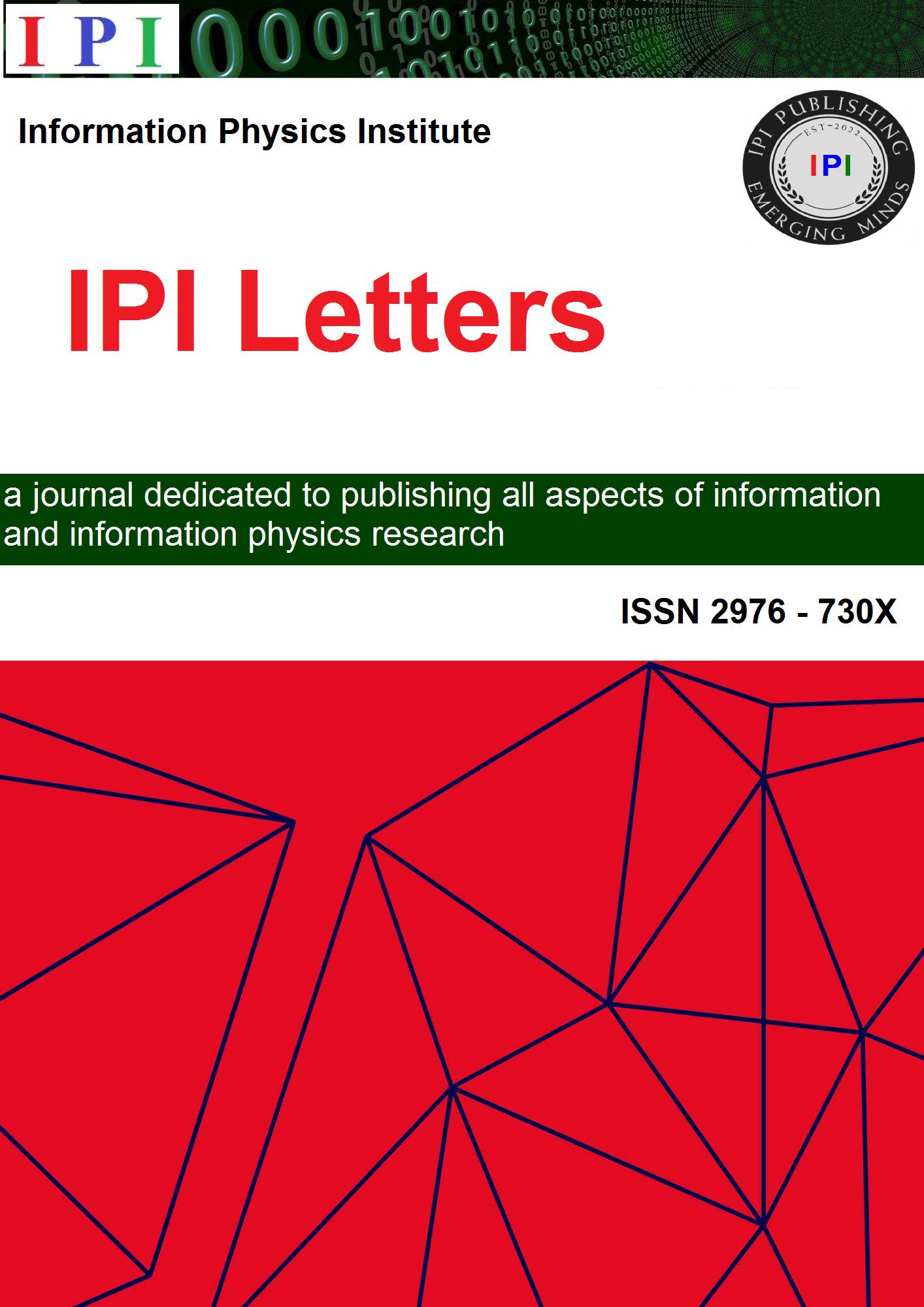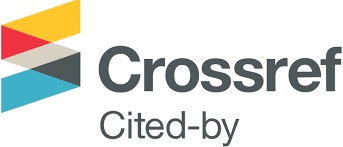Most Read Article Award 2025
Congratulations to Danny Goler, the Winner of the 2024-2025 Most Read Article Award of the IPI Letters.
We accept articles in a wide range of topics, including but not limited to:
- Physics of information
- Information in cosmology
- Quantum information technologies
- Digital information technologies
- Big data and information data storage
- Information theory and mathematics
- Information as the fifth state of matter
- Information entropy
- Information processing and cyber security
- Biological information and bio-informatics
- Sustainable information and environmental data science solutions
- Interdisciplinary and speculative studies at the intersection of information, mathematics, physics, and beyond
- Abstract and philosophical explorations of the nature of information, consciousness, and the interplay between computation and reality
Manuscript types
Article: Standard article contributions in IPI Letters serve as the foundation of scholarly research published in the journal. These articles provide a comprehensive and in-depth exploration of research topics, presenting original findings, methodologies, and analyses in the field of information science. Standard articles are typically longer in length, allowing authors to delve into their research in detail and provide a thorough examination of their work.
Review: Review articles play a crucial role in synthesizing and summarizing existing knowledge, providing a comprehensive overview of a specific topic within the field of information science. These articles offer valuable insights, analysis, and interpretation of the existing literature, making them a valuable resource for researchers, students, and professionals seeking to understand the current state of research in a particular area.
Erratum: In the unfortunate but perfectly normal case that a published article has some errors in it, the author(s) has (have) the option to submit corrections as an "Erratum" article. The Erratum should have no abstract and no article sections. However, it can contain references. The title of the Erratum must be:
Erratum - Followed by the original article tile and DOI.
Opinions: IPI Letters welcomes "Opinions" as a unique type of contribution that provides authors with the opportunity to express their viewpoints, insights, and perspectives on topics related to information science. Unlike research articles, "Opinions" do not report new research findings or present rigorous empirical analysis. Instead, they offer authors a platform to share their expert opinions, observations, or speculative ideas on emerging trends, theoretical frameworks, policy matters, or thought-provoking concepts within the field of information science.
Please note that "Opinions" articles undergo an editorial review process focused on ensuring clarity, relevance, and respectful discourse. While they do not undergo the same rigorous peer review as research articles, the editorial team assesses these contributions for their scholarly value, coherence, and adherence to the journal's guidelines.
Publishing an "Opinions" article in IPI Letters offers authors an opportunity to share their unique insights and engage in scholarly discourse within the field of information science. We encourage authors to seize this platform to contribute to the intellectual enrichment of the scientific community.
News and Views: IPI Letters welcomes "News and Views" as a distinct type of contribution that allows authors to provide updates, summaries, or commentary on recent developments, significant events, or noteworthy findings within the field of information science. This non-peer-reviewed section serves as a platform for authors to share concise and informative pieces that highlight the latest trends, advancements, or emerging topics of interest.
Communications: IPI members frequently exchange interesting ideas within the IPI Private Members Google Group. With "Communication" articles we provide a platform to our IPI members to share these exchanges with a wider audience beyond the IPI members group. The Communication articles are not peer-reviewed research articles and may not necessarily be supported by scientific evidence. They represent the personal perspectives and interpretations of the authors, their ideas, proposals, speculations and even philosophical debates on diverse scientific matters.
Manuscript preparation: All manuscripts should be prepared in English language, in accordance with our formatting guidelines, which can be found below. The manuscript must be carefully proofread prior to submission. All submissions must be prepared using either Word or LaTeX.
For LaTeX submissions, please use our Article LaTeX Template.
For DOC or DOCX submission, please submit your article as a single file, containing all the text, tables, images and captions in it. The following guidance should be observed when preparing a DOC or DOCX submission:
Title
The title is one the most important parts of an article. It must be catchy, relevant to the work, not too long or too short. It must not contain abbreviations, acronyms, or grand claims.
Affiliation
You must list all co-authors and their affiliations. For IPI members, use:
Information Physics Institute, Gosport, Hampshire, UK (www.informationphysicsinstitute.org)
Abstract
The abstract is a mandatory element that should summarize the contents and key findings of the paper. The abstract should contain no more than 500 words. Do not include equations and acronyms in the abstract.
Keywords
Please list your keywords, separated by semicolons. The first letter of each keyword should be capitalized.
Preparation of your manuscript
Your contribution must be prepared in Microsoft Word. The entire manuscript uses
Times New Roman. Section headings are optional and must be Bold.
If figures, tables, animations or text quotations from copyrighted works (including websites) are included in your paper, permission must be obtained from the copyright holder (usually the original publisher) and the author(s).
Equations should be numbered for reference. The numbers should be consecutive within the contribution, with numbers enclosed in parentheses and set on the right margin. Please do not include section counters in the numbering.
Please use the equation editor to edit your equations. We request each equation to be inserted into one row.
Figures and tables
It is essential that all illustrations are clear and legible. All figures and tables should be embedded in the text. Vector graphics should be used for diagrams and images whenever possible (JPG, TIFF, PNG, EPS, etc). Please check that the lines in line drawings are not interrupted and have a constant width. Grids and details within the figures must be clearly legible and may not be written one on top of the other. Figures are to be numbered and must have a caption which should always be positioned under the figures, in contrast to the caption belonging to a table, which should always appear above the table. Figures and Tables should be cross-referred in the text.
Attention: If figures, tables or text quotations from copyrighted works (including websites) are included in your paper, permission must be obtained from the copyright holder (usually the original publisher) or the author(s) and citations to the original works must be added.
Citations
Arabic numbers are used for citation, which is sequential by order of citation. The reference numbers are given in brackets and are not superscript. Please observe the following guidelines:
Single citation: [9]
Multiple citations: [4-6,9].
The numbers should be listed in numerical order.
Sequential citation by order of citation: reference [7] cannot be cited before reference [5], for example.
If an author’s name is used in the text: “Miller [9] was the first …” please write all references using the Latin alphabet. If the title of the book you are referring to is, e.g. in Russian or Chinese, then please write (in Russian) or (in Chinese) at the end of the transcript or translation of the title. Do not include references to pieces of work that are not connected with your paper.
Acknowledgments
Acknowledgments are a place to recognize any contributions made to the paper that do not meet the criteria for authorship. This may include technical support, gifts received, or organizational assistance. Anyone who meets the criteria for authors must be included as an author and not merely acknowledged. Personal acknowledgments (e.g. family members) are acceptable, and it is recommended to add their full name. Titles (Dr., Mr., Prof., etc.) should not be used.
Using AI
Manuscripts prepared with AI help are allowed, but the AI should only augment the article writing, not replace the entire process. Do not submit articles that have too many sections, subsection and sub-subsections, bullet point lines listed in the manuscript excessively and short paragraphs, graphs generated by AI, i.e. create your own graphs and data processing. Articles that are more than 50% AI generated will be automatically rejected.
ISSN 2976 - 730X



Congratulations to Danny Goler, the Winner of the 2024-2025 Most Read Article Award of the IPI Letters.

 |
 |
 |
 |
 |
The journal is licensed under a Attribution International (CC BY).
Copyright © IPI Publishing - Information Physics Institute
This site uses cookies. By continuing to use this site you agree to our use of cookies.
The content published in IPI Letters is provided for informational purposes only and reflects the research and opinions of the respective authors. While the editorial board of IPI Letters undertakes efforts to evaluate submissions for quality and scientific merit, the authors bear full responsibility for the accuracy, integrity, and originality of their work. The journal, its editorial board, and its legal owner disclaim all liability for any inaccuracies, omissions, or errors in the published content.
